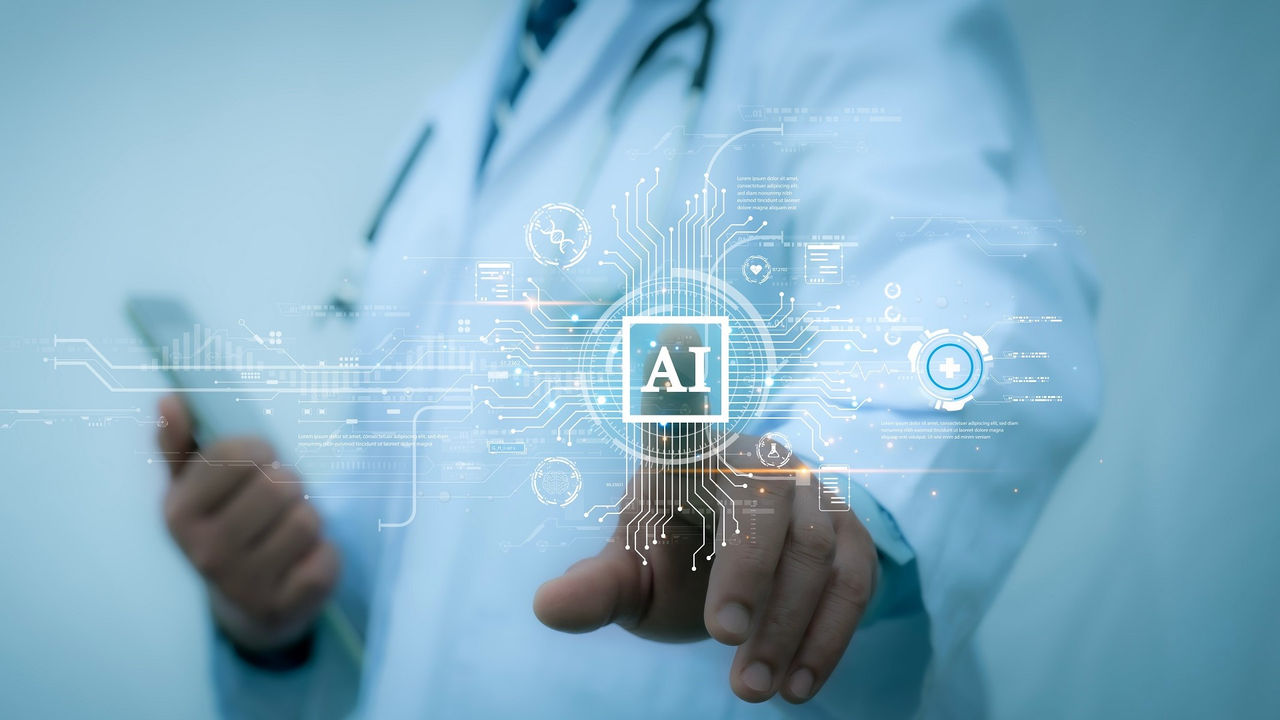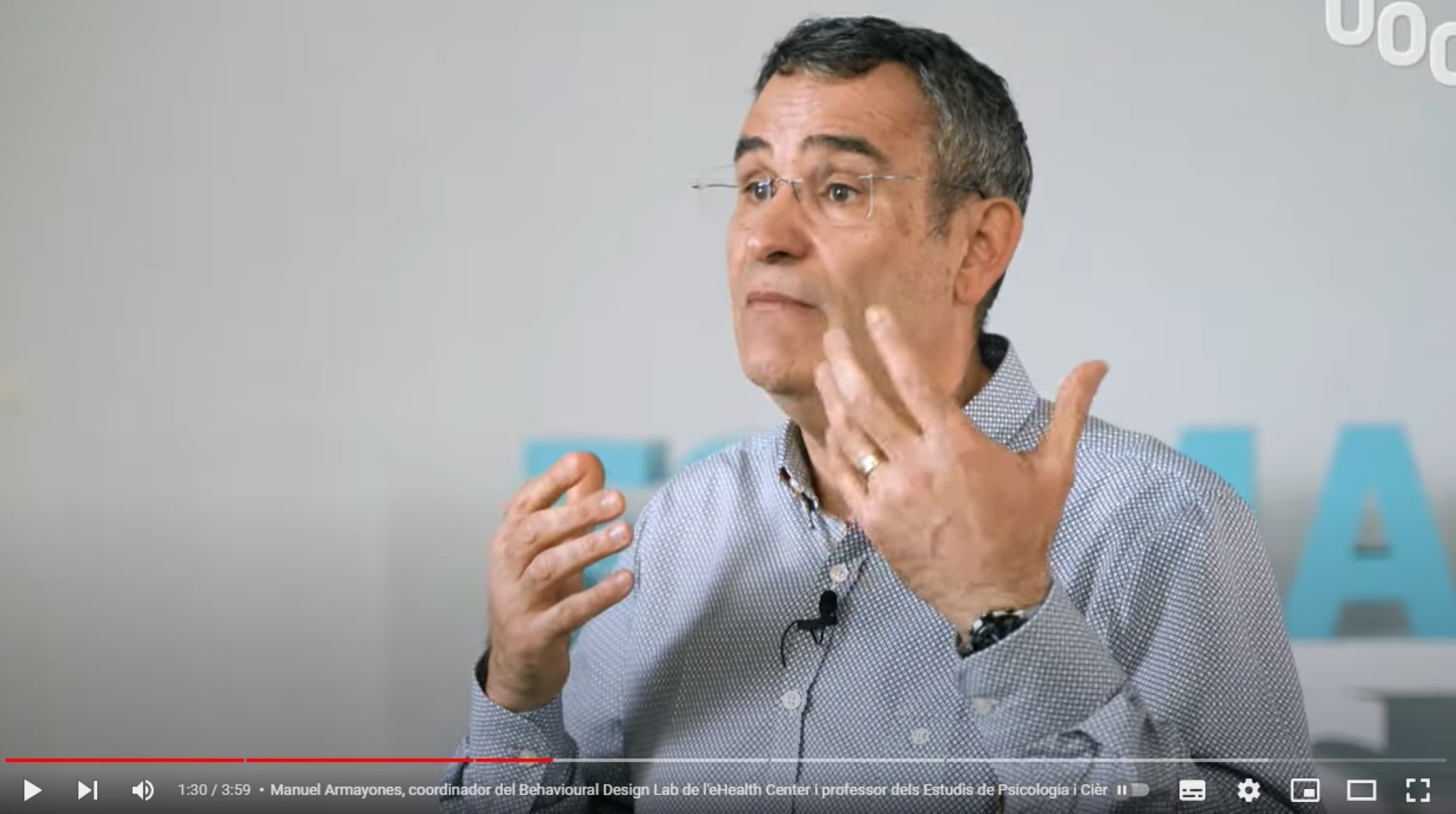How will artificial intelligence change the future of healthcare?
Five experts at the UOC analyse the advances made in aspects of healthcare such as diagnosis, mental health and public safety
Early diagnosis, the ability to predict natural disasters, more effective drugs, suicide prevention... With its ability to process and make sense of enormous amounts of data, artificial intelligence (AI) is the technology that has made the greatest strides in the field of healthcare in the last few years. And, according to experts, its future is even brighter.
"Over the last year, AI has experienced a boom among the general public, but in medical research we've been using it for much longer. As we keep tweaking it to make it better, we'll soon see, in the next few years, useful clinical applications emerge. This isn't the future: it's the present or a very immediate future," says Salvador Macip, dean of the Faculty of Health Sciences at the UOC (Universitat Oberta de Catalunya) and a researcher with the university's FoodLab group.
Early diagnosis of diseases
But which specific areas will benefit the most? How will it affect people's health if we rely on it? According to Laia Subirats, member of the UOC's Faculty of Computer Science, Multimedia and Telecommunications and researcher with the Cognitive Neuroscience and Applied Data Science Lab (NeuroADaS Lab) research group of the UOC's eHealth Center, one of the fields in which the greatest advances may be made is in diagnosing medical conditions, which will become both faster and more effective.
"We now have new sensor and image processing techniques, as well as a variety of technologies, such as natural language processing (NLP) and federated learning for electronic health records (EHRs)," she points out. One such application, for example, can be seen in the study published in Nature by a group of US researchers from the Cedars-Sinai Medical Center and Stanford University that found that AI is better than humans at assessing echocardiograms, a type of imaging method used for the diagnosis of heart conditions. Another application is early diagnosis and screening to increase survival rates in lung cancer patients, for which a trial is being carried out in the UK.
"Processing data takes a certain amount of time but, with AI, data can be analysed in real time, speeding up the detection of any anomalies there may be. And this can be applied both to monitoring and to surgical assistance," says Subirats.
Mental health: AI for the prevention of suicide and juvenile disorders
Another field that can greatly benefit from AI is psychology. As explained by Manuel Armayones, lead researcher at the Behavioural Design Lab (BDLab) of the eHealth Center and member of the UOC's Faculty of Health Sciences, in a saturated public system in which there is a shortage of public health psychologists, AI can become a key tool. "AI must never replace psychologists, but it can be used to increase the capacity and scope of those who now at work," he says, asserting that it will be able to speed up assessment and diagnosis processes, carry out preliminary screenings to identify urgent and serious cases, and provide support in emergencies such as suicide prevention or cases of serious juvenile disorders, "which are among the situations that cause most suffering and social concern nowadays".
Furthermore, the UOC researcher believes that AI has great potential to provide daily support in processes exacerbated by loneliness, by providing constant and personalized monitoring of people in situations of isolation, "but mainly as a tool that can be used by psychologists both to carry out much better assessments of patients' social, family and personal circumstances and to provide people in specific contexts with real-time information about resources, activities, training courses, etc." These recommendations would be very much tailored to each patient "and could offer barrier-free experiences fostering personal and physical interactions in their surroundings. I see AI not as a tool to be used in isolation but as part of a comprehensive plan to tackle situations at various levels," says Manuel Armayones.
Predicting risks to public safety
Early diagnosis and mental health are not the only areas in which AI can prove useful. Andreas Kaltenbrunner, a researcher with the IN3's Artificial Intelligence and Data for Society (AID4So) group, believes that AI tools can also play a key role in conflict resolution to tackle society's increasing polarization. "We can do this by using AI-powered tools to analyse data on current conflicts, identify recurring patterns and predict areas where new tensions may arise. Furthermore, they can detect polarization during debates, summarize opposing points of view, highlight common ground and suggest possible areas of compromise," he says.
AI can also be used to predict natural disasters using images posted on social media, as shown by a project led from the Massachusetts Institute of Technology (MIT) involving Àgata Lapedriza, lead researcher of the Artificial Intelligence for Human Well-being (AIWELL) group of the eHealth Center and member of the UOC's Faculty of Computer Science, Multimedia and Telecommunications. This research project used computer vision tools that, after being trained with 1.7 million photographs, proved to be effective in the analysis, filtering and detection of real-life disasters such as floods, tornadoes and wildfires.
"AI can do things that would be impossible for a human to do without computers. An example of this is the ability to process huge amounts of data," says Lapedriza, who has also been involved in a project with researchers from the CoSIN3 group, led by Javier Borge at the UOC's IN3 institute, and the company DetectA, using publicly available aerial images to automatically detect roofs with asbestos, a highly polluting product that is dangerous to people's health.
They did this by creating a neural network (a deep learning model) able to identify, with a success rate of around 80%, whether a roof has asbestos based on an aerial image of the roof. "These images of roofs with and without asbestos can be used to train the neural network to predict outcomes on roofs it is yet to see. The network learns to identify the typical visual patterns of roofs that have asbestos (based on certain colours or textures, for example) and can then learn to classify (with or without asbestos) roofs it has never seen before," says Lapedriza.

How can we ensure that AI is high-quality and transparent?
The list of advances being made thanks to AI is long, but according to experts, this technology is also subject to barriers and limitations. According to Andreas Kaltenbrunner, one of them is a lack of transparency and explainability. "Understanding how AI models reach their conclusions is key when it comes to building trust and ensuring that these results can be justified. Without a clear view of their inner workings, users may be reluctant to fully adopt an AI solution," he says.
Furthermore, in order to develop and implement AI systems, we need resources such as computing power, specialist expertise and infrastructure. And not everyone has equal access to these resources, "which could exacerbate the current inequalities and call into question the sustainability and environmental impact of this resource-hungry technology," he adds.
In addition, as Laia Subirats explains, we need more high-quality data and a collaborative environment that leads to greater interdisciplinarity, as well as a management policy that guarantees data privacy, security and governance. But, above all, if AI is to be used in healthcare, oversight is required in order for the wider public to benefit from it.
"AI is a tool. It's not replacing human work but facilitating it, if we do it well," explains Salvador Macip. "I think of it as a calculator: it can do your calculations for you, but you've got to give it the figures. It can calculate much faster than us, but on its own it can't do anything. AI is a similar tool." According to Macip, AI's greatest potential lies with its huge data processing capacity and its ability to appear to think, "but AI is not actually creating anything; it's putting information together to generate new models, using things that were already there. Its interpretation of data has to be qualified, moderated, worked on... And that's where we come in."
Experts UOC
Press contact
-
Anna Sánchez-Juárez


